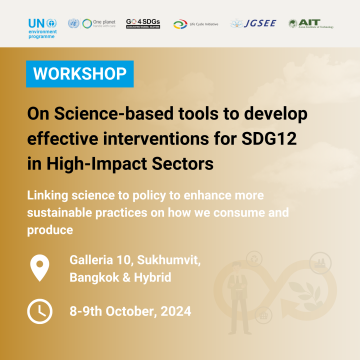
Background
Asia is becoming a global centre for production and consumption. Urbanization and rising middle-income populations are changing consumption habits in Asia. Asia’s GDP growth reached 5.8% in 2021, emphasizing the need for sustainable consumption and production practices. Furthermore, the triple planetary crisis (i.e. climate change, biodiversity loss, pollution) requires urgent global action. Asia’s resource consumption and CO2 emissions exceed global averages, hindering responsible consumption and production. Scientific data and knowledge are key in effectively implementing SCP and addressing the triple planetary crisis. Scientific data, analysis and tools help identify the most impactful solutions and thereby facilitates evidence-based strategic planning and decision-making.
The Sustainable Consumption and Production Hotspot Analysis Tool (SCP-HAT, scp-hat.lifecycleinitiative.org) is an online entry level assessment tool for environmental pressures and impacts at the national and sector level and offers a territorial and footprint perspective for identifying priorities for SCP policy efforts. UNEP’s 10YFP in collaboration with Asian Institute of Technology (AIT) and Joint Graduate School of Environmental Engineering (JGSEE-KMUTT) developed an analytical report, a regional assessment applying SCP Hotspot Analysis Tools (SCP-HAT). The main objectives of the report include:
- Provide a comprehensive regional assessment on sustainable consumption and production, resource efficiency, and the triple planetary crisis, to develop a rational model for addressing regional challenges.
- examine the interconnections between regional challenges, emphasizing sustainable consumption and production (SCP), resource efficiency, and the triple planetary crisis.
- understand how SCP practices intersect with regional issues and challenges, shedding light on consumption and production patterns’ status and impacts.
- identify key factors influencing changes in regional challenges and the obstacles encountered, aiming to uncover avenues for improvement.
- facilitate the practical implementation of SCP actions through a holistic approach, aiming to mitigate regional challenges and contribute to overall improvement
Objectives of the workshop
In partnership with AIT and JGSEE and in collaboration with LCI Team and GO4SDGs, UNEP’s 10YFP is organizing the regional workshop highlight the need to link science to policy to enhance more sustainable practices on how we consume and how we produce. SCP HAT was developed to assist policy makers to identify hotspots of unsustainable consumption and production. High impact sectors were identified based on the latest data. This workshop has objectives to
- Strengthen the use of SCP HAT tool https://scp-hat.org/ in Asia through the launch of the Booklet and discussion of assessment findings,
- Promote the use of science-based tools to accelerate the achievement of the 2030 Agenda
- Establish the link between SCP actions to support the implementation of the Global Biodiversity Framework
- Discuss the challenges and opportunities to integrate SCP actions and SDG12 into high impact sectors through national planning process and UNCT support
Targeted Participants
- NFPs and MEAs in Asia
- Technical/academic institutes/science partners
Highlights
- Launch of the Booklet – dissemination and discussion of findings of assessment, based on SCP HAT Analysis
- Discussion of high impact sectoral policies in Asia – challenges in integration and strategies to mainstream SCP actions and circular economy into sectors through national process and UNCT systems
- Dissemination of science-based tools to enhance sustainability
- Establishment of the policy linkages between SCP and Biodiversity
- Discussion on enabling policies to accelerate the implementation of SDG12 and reporting
- Capacity Building on SCP HAT tool

